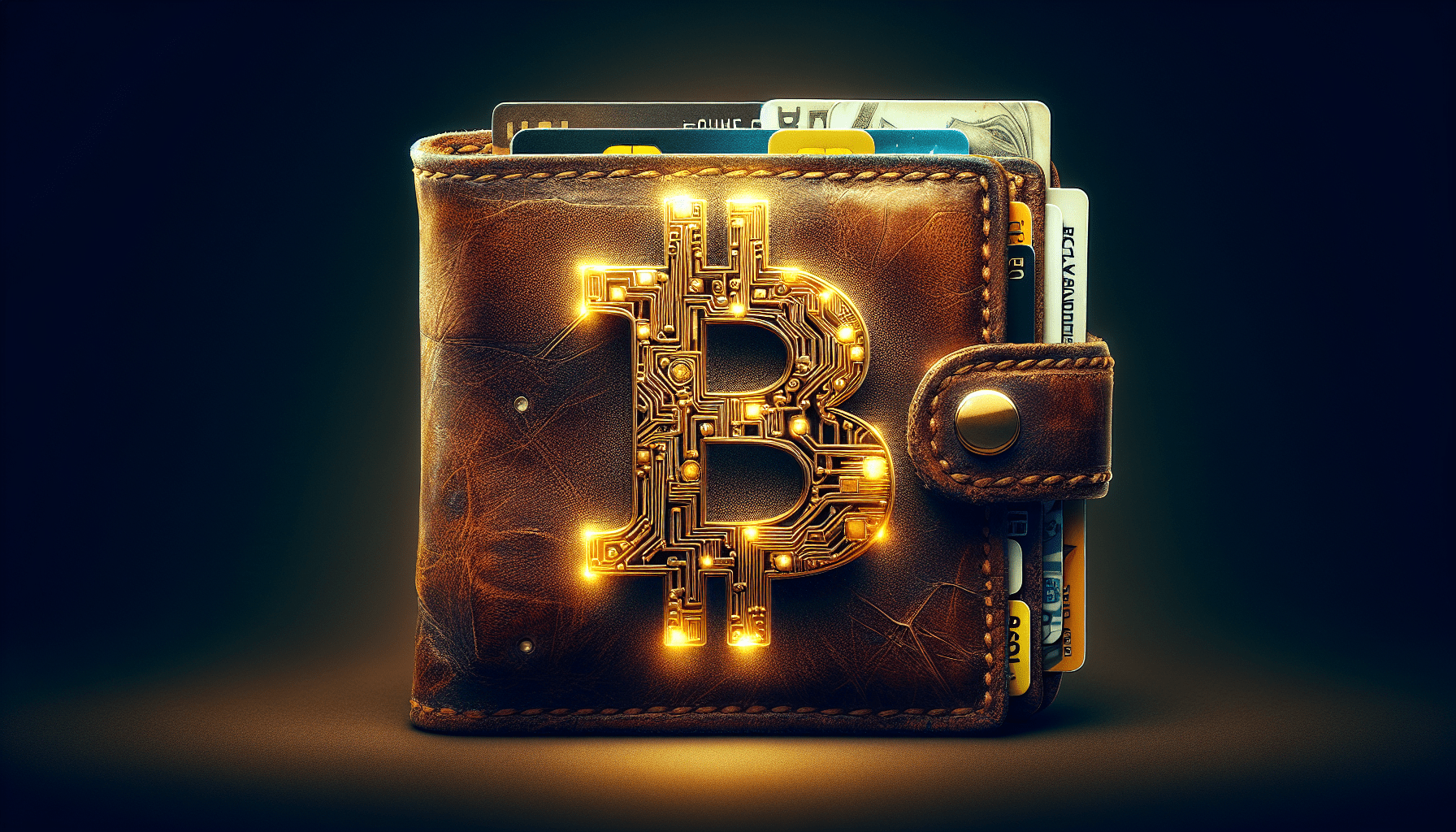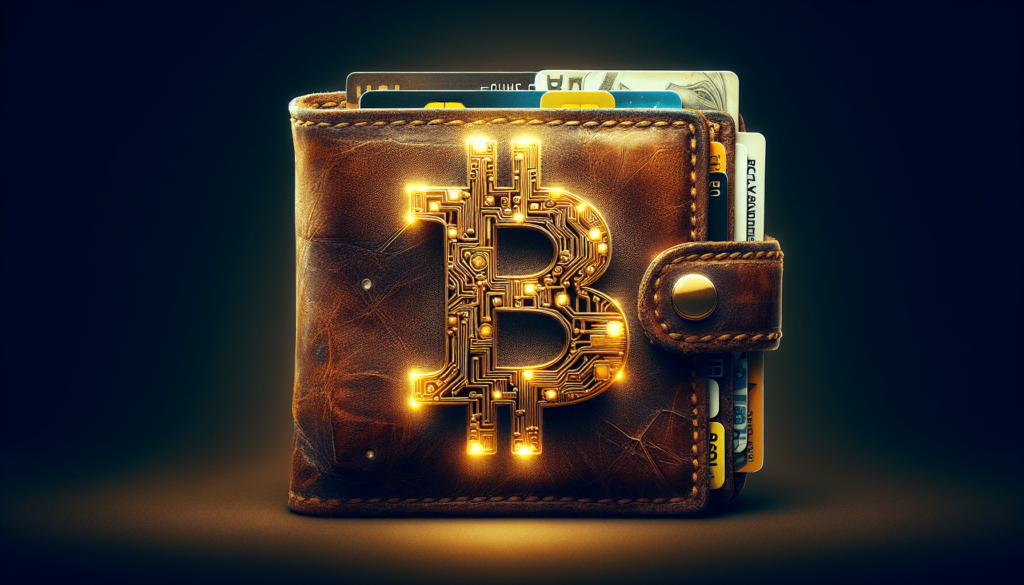Can Someone Transfer Money To A Bitcoin Wallet?

So, you’re curious if it’s possible for someone to transfer money to a Bitcoin wallet? Well, lucky for you, the answer is a resounding yes! In this digital age, the world of finance has undergone a remarkable transformation, and Bitcoin has emerged as a leading player. Whether you’re a seasoned cryptocurrency enthusiast or just dipping your toes into the world of digital currencies, understanding how money can be transferred to a Bitcoin wallet is essential. So, let’s unravel the mysteries of this modern financial phenomenon together, shall we?
What is a Bitcoin wallet?
Definition of a Bitcoin wallet
A Bitcoin wallet is a digital tool that allows you to securely store, send, and receive Bitcoin. It essentially functions as a digital wallet for your virtual currency. Just like a physical wallet holds your cash and cards, a Bitcoin wallet holds your digital money. It allows you to manage your Bitcoin balance, access your funds, and make transactions.
Types of Bitcoin wallets
There are several types of Bitcoin wallets available, each with its own unique features and advantages. The main types of Bitcoin wallets include:
-
Desktop wallets: These wallets are installed on your computer and give you full control over your funds. They provide a high level of security but require regular backups to protect against computer failures or malwares.
-
Mobile wallets: Mobile wallets are specifically designed for smartphones and tablets. They are convenient and allow you to access your Bitcoin funds on the go. However, they may pose slightly less security than desktop wallets due to the potential risk of losing your mobile device.
-
Web wallets: Web wallets are online services that store your Bitcoin funds on their servers. They offer easy accessibility from any device with an internet connection and are generally user-friendly. However, they might be vulnerable to hacking attacks, so it’s essential to choose a reputable web wallet provider.
-
Hardware wallets: Hardware wallets are physical devices that store your Bitcoin offline, providing the highest level of security. They keep your private keys offline, making it practically impossible for hackers to access your funds. Hardware wallets are considered the safest option, especially for storing large amounts of Bitcoin.
-
Paper wallets: Paper wallets are a form of cold storage where your private key is printed on paper. They are considered extremely secure since they are not connected to the internet. However, they require careful handling to prevent physical loss or damage.
How Bitcoin wallets work
Bitcoin wallets work based on public-key cryptography. When you create a Bitcoin wallet, you are essentially generating a pair of cryptographic keys: a public key and a private key.
The public key is used as your Bitcoin wallet address, allowing others to send funds to you. It is safe to share this address with others, as it only allows incoming transactions and does not grant access to your funds.
On the other hand, the private key is kept secret and serves as proof of ownership over the Bitcoin stored in your wallet. It is crucial to never share your private key with anyone, as anyone who has access to it can control and transfer your funds.
When you receive Bitcoin to your wallet address, a transaction is broadcasted to the Bitcoin network. This transaction is signed with your private key to verify its authenticity. To send Bitcoin from your wallet, you must sign the transaction using your private key, proving that you are the rightful owner of the funds.
Sending Money to a Bitcoin Wallet
Using a Bitcoin exchange or wallet provider
One common method of sending money to a Bitcoin wallet is through a Bitcoin exchange or wallet provider. These platforms allow users to buy Bitcoin using fiat currency and deposit it directly into their wallet. To use this method, you typically need to create an account on the exchange or wallet provider, complete any necessary verification processes, and then deposit funds into your account. Once the funds are in your account, you can transfer them to your Bitcoin wallet within the platform.
Sharing a Bitcoin wallet address
Another way to receive money in your Bitcoin wallet is by sharing your wallet address directly with the sender. Your wallet address is a unique identifier consisting of a string of numbers and letters. It works similar to an email address, allowing others to send Bitcoin directly to your wallet. To share your wallet address, you can simply copy it from your wallet and send it to the sender through a messaging platform or any other means of communication.
Transferring funds to a Bitcoin wallet
To transfer funds to your Bitcoin wallet, the sender needs to initiate a transaction from their wallet. They would need to know your wallet address and enter it correctly during the transaction process. Once the transaction is confirmed by the Bitcoin network, the funds will appear in your wallet, ready to be managed or used for further transactions. It’s important to double-check the wallet address provided by the sender to ensure the funds are sent to the correct destination.

Bitcoin Wallet Address
What is a Bitcoin wallet address?
A Bitcoin wallet address is a unique identifier that represents your wallet on the Bitcoin network. It is a combination of letters and numbers, typically in the form of a QR code or a string of characters. This address is essential for receiving Bitcoin from others and serves as a destination for incoming transactions. Each Bitcoin wallet address is unique, and no two addresses can be the same, ensuring the security and traceability of Bitcoin transactions.
Generating a Bitcoin wallet address
When you create a Bitcoin wallet, the wallet software automatically generates a new Bitcoin address for you. This process usually involves complex mathematical algorithms that ensure the uniqueness and security of the address. The software uses your private key to derive the corresponding public key, which is then converted into a wallet address format. Some wallets allow users to generate multiple addresses, providing additional privacy and security options.
Public and private key pairs
Behind every Bitcoin wallet address is a pair of cryptographic keys: a public key and a private key. The public key is derived from the private key using complex mathematical operations. As the name implies, the public key can be shared with others, allowing them to send Bitcoin to your wallet address. The private key, on the other hand, should be kept secret and serves as proof of ownership and control over the funds in your wallet. It is crucial to protect your private key and never share it with anyone, as anyone who possesses it can access and control your Bitcoin.
Transferring Money to a Bitcoin Wallet
Sender’s perspective
When someone wants to send money to a Bitcoin wallet, they can initiate a transaction from their own wallet. They would need to enter the recipient’s wallet address correctly, ensuring that the funds are sent to the intended destination. The sender’s wallet software allows them to specify the amount of Bitcoin they wish to send and may also provide an option to adjust the transaction fee. Once the transaction is confirmed by the Bitcoin network, the funds are deducted from the sender’s wallet balance and added to the recipient’s wallet balance.
Receiver’s perspective
From the receiver’s perspective, transferring money to a Bitcoin wallet involves providing their wallet address to the sender. This address can be shared through various means, such as messaging platforms, email, or by scanning a QR code. Once the sender initiates the transaction, the Bitcoin network processes it and includes it in a block within the blockchain. The recipient can then see the incoming transaction in their wallet, and the funds become available for them to manage or use for further transactions.
Confirming the transaction
After the sender initiates a transaction and it gets broadcasted to the Bitcoin network, it undergoes a confirmation process. This process involves Bitcoin miners validating the transaction and adding it to a block in the blockchain. Each block contains a collection of transactions, and once a block is confirmed, it becomes part of the permanent public ledger. Depending on the congestion of the Bitcoin network and the transaction fee chosen by the sender, it may take a few minutes to several hours for a transaction to be confirmed. Once a transaction receives multiple confirmations, it is considered final and irreversible.

Transaction Fees
Understanding transaction fees
When sending money to a Bitcoin wallet, transaction fees may apply. Transaction fees are paid to Bitcoin miners who prioritize and confirm transactions on the network. These fees incentivize miners to include the transaction in a block within the blockchain. The amount of the transaction fee can vary and depends on factors such as network congestion, transaction size, and fee priority set by the sender. Higher transaction fees generally result in faster confirmation times, while lower fees may lead to longer confirmation times.
Factors affecting transaction fees
Several factors can influence the transaction fees associated with sending money to a Bitcoin wallet. Firstly, the size of the transaction in bytes plays a role, as larger transactions require more space in a block. Additionally, network congestion can impact transaction fees. When the network is congested with many pending transactions, miners prioritize transactions with higher fees to maximize their earnings. Lastly, the fee priority set by the sender can also affect the transaction fees. Wallet software typically offers fee options such as low, medium, or high, allowing users to adjust the fee according to their desired confirmation time.
Choosing transaction fee priority
Choosing the right transaction fee priority depends on your needs and the urgency of the transaction. If speed is essential, selecting a higher fee priority can help expedite the confirmation process. On the other hand, if time is not a concern, you can opt for a lower fee priority to save on transaction costs. Wallet software often provides an estimation of the confirmation time based on the selected fee priority, allowing you to make an informed decision. It’s important to note that excessively low fees may result in longer confirmation times or even the rejection of the transaction by miners.
Security Considerations
Securing your Bitcoin wallet address
As a Bitcoin wallet owner, it’s crucial to take measures to secure your wallet address. Firstly, be cautious when sharing your wallet address with others and ensure that you’re providing the correct address. Scammers may attempt to trick you into sending funds to a fraudulent address, so always double-check the address before transferring any Bitcoin. Secondly, consider using a hardware wallet or offline storage option for added security. By keeping your wallet offline, you reduce the risk of online attacks or malware compromising your funds.
Importance of keeping private keys safe
The private key associated with your Bitcoin wallet address is the most sensitive and critical piece of information when it comes to securing your funds. Losing or compromising your private key can result in the loss of your Bitcoin. Therefore, it is imperative to store your private keys securely. Hardware wallets are a popular choice for storing private keys since they keep the keys offline and provide additional security measures. Alternatively, you can use encrypted storage or backup solutions to protect your private keys from unauthorized access.
Using two-factor authentication
Two-factor authentication (2FA) is an additional layer of security that can be enabled for your Bitcoin wallet. 2FA requires you to provide a second form of verification, such as a unique code generated by a mobile app, in addition to your password when accessing your wallet. This adds an extra barrier against unauthorized access, even if someone manages to obtain your password. Enabling 2FA provides an extra level of security and reduces the risk of unauthorized access to your Bitcoin wallet.
Limits and Restrictions
Possible limits on transferring funds
When transferring funds to a Bitcoin wallet, it’s important to be aware of any potential limits or restrictions that may apply. Some Bitcoin exchanges or wallet providers may impose limits on the amount of Bitcoin that can be transferred within a specific time period. These limits are typically in place to comply with anti-money laundering (AML) and know your customer (KYC) regulations. Additionally, some jurisdictions may have specific regulations or restrictions on the use and transfer of Bitcoin. It’s essential to familiarize yourself with any applicable limits or regulations to ensure compliance when transferring funds to a Bitcoin wallet.
Verification requirements
To prevent fraud and money laundering, Bitcoin exchanges and wallet providers often have verification requirements in place. These requirements may include verifying your identity by providing personal information and documentation. The verification process can vary depending on the platform and the amount of Bitcoin you intend to transfer. It’s important to understand and comply with these verification requirements to ensure a smooth and secure transfer of funds to your Bitcoin wallet.
Legal and regulatory considerations
The legality and regulatory framework surrounding Bitcoin and cryptocurrency vary from country to country. Some jurisdictions embrace and regulate cryptocurrency, while others have imposed restrictions or outright bans. Before transferring funds to a Bitcoin wallet, it’s crucial to understand the legal and regulatory landscape in your jurisdiction. This will help you ensure compliance and avoid any legal complications that may arise from transferring or holding Bitcoin.
Possible Risks
Potential for fraud or scams
As with any financial transaction, there is always a risk of fraud or scams when transferring money to a Bitcoin wallet. Scammers may attempt to impersonate reputable wallet providers or exchanges, tricking users into sending their funds to fraudulent addresses. It’s essential to exercise caution, double-check addresses, and only transact with trusted and reputable platforms. Avoid clicking on suspicious links or sharing sensitive information with unknown individuals or entities.
Loss of funds due to user error
User error can also lead to the loss of funds when transferring money to a Bitcoin wallet. Mistyping a wallet address or sending Bitcoin to the wrong destination can result in irreversible loss. It is crucial to take the time to double-check wallet addresses before initiating a transaction and ensure you are sending Bitcoin to the intended recipient. Paying attention to detail and being cautious can go a long way in preventing avoidable losses.
Hacking and security breaches
Bitcoin wallets, especially those connected to the internet, can be susceptible to hacking and security breaches. Hackers may attempt to gain unauthorized access to wallets and steal funds. To mitigate this risk, it’s important to use reputable and secure wallet providers, enable two-factor authentication, and keep your software and devices up to date with the latest security patches. Additionally, storing large amounts of Bitcoin in offline storage or hardware wallets can provide an extra layer of security against online attacks.
Alternative Methods
Using third-party payment processors
Apart from direct transfers to a Bitcoin wallet, another way to send money to a Bitcoin wallet is by using third-party payment processors. These processors act as intermediaries, allowing users to exchange fiat currency for Bitcoin and deposit it into their wallets. They provide a seamless and user-friendly experience, often accepting various payment methods such as credit cards or bank transfers. However, it’s important to research and choose a reputable payment processor to ensure the security of your funds.
Using Bitcoin ATMs
Bitcoin ATMs are another alternative method to transfer money to a Bitcoin wallet. These machines allow users to buy Bitcoin with cash or deposit Bitcoin into their wallets. To use a Bitcoin ATM, you typically need to have a Bitcoin wallet address ready and follow the on-screen instructions to complete the transaction. Bitcoin ATMs can be found in various locations globally and offer a convenient way to convert cash into Bitcoin quickly.
Peer-to-peer transactions
Peer-to-peer (P2P) transactions involve directly transferring Bitcoin from one wallet to another without the need for intermediaries. P2P platforms or marketplaces facilitate these transactions, connecting buyers and sellers of Bitcoin. This method allows for greater privacy and eliminates the need for third-party involvement. However, it’s essential to exercise caution when engaging in P2P transactions and only transact with trusted and reputable individuals.
Conclusion
Transferring money to a Bitcoin wallet offers accessibility and convenience for managing your digital funds. By understanding the process of sending money to a Bitcoin wallet, the importance of security measures, and the potential risks, you can confidently navigate the world of Bitcoin transactions. As technology continues to advance, Bitcoin wallet technology will likely evolve, providing even more secure and user-friendly solutions for managing and utilizing your Bitcoin funds. With proper knowledge and precautions, you can take advantage of the benefits Bitcoin wallets offer, secure your funds, and embrace the future of digital currency.





